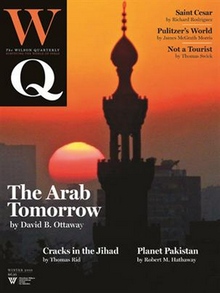Wilson Quarterly
 |
|
| Categories | Culture, Literature, Politics, Current Events |
|---|---|
| Frequency | Quarterly |
| Circulation | 70,000 |
| First issue | 1976 |
| Company | Woodrow Wilson International Center for Scholars |
| Country | United States |
| Based in | Washington, D.C. |
| Language | English |
| Website | www |
| ISSN | 0363-3276 |
| OCLC number | 743409751 |
The Wilson Quarterly is a magazine published by the Woodrow Wilson International Center for Scholars in Washington, D.C. The magazine was founded in 1976 by Peter Braestrup and James H. Billington. It is noted for its nonpartisan, nonideological approach to current issues, with articles written from various perspectives. Designed to make the research and debates of scholars and intellectuals accessible to a general audience, it covers a wide range of topics, from science policy and literature to foreign affairs.
The first issue appeared in Autumn 1976 and established two of the magazine's signature features. Article "clusters" explore different facets of a subject, often with contrasting points of view. Early subjects ranged from the exploration of space to the new revisionist history of the New Deal, with writers including Walt W. Rostow, Rem Koolhaas, George F. Kennan, John Updike, Carlos Fuentes, and Mario Vargas Llosa. The magazine also includes individual essays. The Wilson Quarterly's other signature feature is its "In Essence" section, which distills more than two dozen notable articles selected from hundreds of scholarly journals and specialized publications.
The magazine has gone through various format changes over the years, and between 1983 and 1990 it was published five times a year. Today, as its name suggests, it is published quarterly.
When Peter Braestrup left the magazine in 1989 to join Billington at the Library of Congress, he was succeeded by Jay Tolson, the magazine's literary editor. Tolson added a successful poetry section designed to introduce readers to significant poets of the past and present. The section was initially co-edited by Joseph Brodsky and poet laureate Anthony Hecht.
...
Wikipedia
